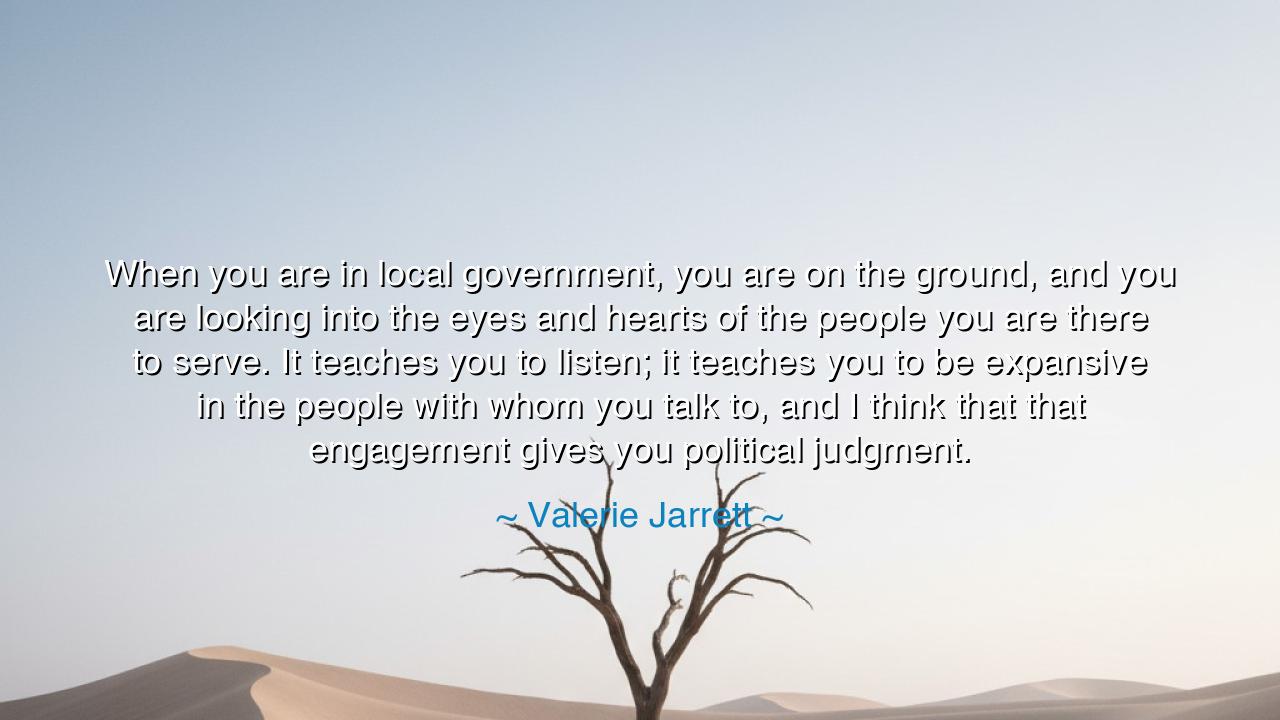
When you are in local government, you are on the ground, and you
When you are in local government, you are on the ground, and you are looking into the eyes and hearts of the people you are there to serve. It teaches you to listen; it teaches you to be expansive in the people with whom you talk to, and I think that that engagement gives you political judgment.






The words of Valerie Jarrett — “When you are in local government, you are on the ground, and you are looking into the eyes and hearts of the people you are there to serve. It teaches you to listen; it teaches you to be expansive in the people with whom you talk to, and I think that that engagement gives you political judgment.” — rise like a hymn to the ancient art of governance, the sacred bond between leader and people. In this reflection, Jarrett — an advisor, reformer, and public servant — speaks not of the cold machinery of politics, but of its living soul. She reminds us that true leadership is not born in lofty chambers or gilded offices, but in the streets, in the homes, and in the hearts of ordinary people. Her words carry the timeless lesson that wisdom in government begins with humility, and that the leader who listens will always see further than the one who commands.
The origin of this quote lies in Jarrett’s own journey through the ranks of public service, from her early days in local government in Chicago to her later role as Senior Advisor to President Barack Obama. She began not in the grandeur of national politics, but in the intimate struggles of neighborhoods and communities — where potholes, schools, housing, and safety were not abstractions, but the daily rhythm of life. It was there, amidst the voices of mothers, workers, and elders, that she learned what governance truly meant: not the wielding of authority, but the stewardship of trust. Thus, her words are not mere theory — they are forged from experience, from the dust and sweat of civic duty.
Jarrett’s insight touches upon an eternal truth known to the wisest rulers of history. The great Marcus Aurelius, emperor and philosopher, once said that to govern well one must see the people not as subjects, but as partners in the order of the world. Likewise, Jarrett’s “looking into the eyes and hearts” of the people echoes the ancient ideal of empathetic leadership — the leader as listener, the ruler as servant. To “listen,” as she says, is not a weakness but a discipline; it is the highest act of governance. For only by listening can one perceive the invisible pulse of a nation — its hopes, its fears, its unspoken truths.
In the old city-states of Greece, the most respected leaders were those who walked among their citizens. Pericles of Athens was known to move through the agora, speaking with merchants and laborers, understanding their needs before shaping the policies that would shape their lives. So too did Jarrett learn, in the neighborhoods of Chicago, that government detached from the people becomes blind bureaucracy, but government rooted in conversation becomes living democracy. In her words, the phrase “on the ground” becomes not a mere metaphor, but a moral compass — reminding us that those who lead from the soil of real human experience grow stronger and wiser than those who rule from towers of abstraction.
She speaks also of being “expansive in the people with whom you talk to.” This, too, is wisdom of the ancients: that true understanding comes not from listening to the loudest voices, but from seeking out the silent ones. The measure of a leader is not found in how they treat the powerful, but in how they attend to the powerless. In every community, there are those whose voices are ignored — the poor, the weary, the forgotten. Jarrett’s call to expansiveness is a call to justice: to include every soul in the conversation of governance, for only then can judgment be whole and humane.
Her final teaching, that such engagement “gives you political judgment,” reveals the heart of her philosophy. Political judgment, in Jarrett’s view, is not clever strategy or partisan mastery — it is moral discernment, born of compassion and understanding. The leader who listens learns not only what policies to make, but why they must be made. Such wisdom cannot be taught in universities nor decreed by law; it is earned through presence, through the courage to face the people’s truths without pride or pretense. Political judgment is the union of knowledge and empathy — the head guided by the heart.
So let this be the lesson handed down: leadership is not distance, but closeness. It is not mastery over people, but partnership with them. Whether in government, business, or family, the principle remains the same — those who listen will lead well; those who isolate themselves in arrogance will fall. A good leader must not only speak, but hear; not only plan, but feel. And above all, they must never forget that power is lent, not owned — a sacred trust that must always serve the greater good.
And thus, remember Valerie Jarrett’s enduring truth: to lead is first to listen. The world will always have rulers who command from afar, but the true shepherd of the people walks among them, learning from their joys and sorrows alike. Let every leader, in every place, descend from their pedestal and meet the eyes of those they serve. For only in that meeting — the gaze between servant and sovereign, between human and human — is born the wisdom that sustains democracy and honors the dignity of all.






AAdministratorAdministrator
Welcome, honored guests. Please leave a comment, we will respond soon